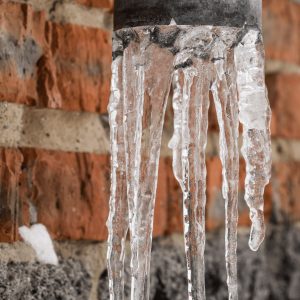
How Do Pipes Freeze?
When water freezes, it expands and puts pressure on the water pipes. This pressure can cause them to burst and result in a major water damage disaster. Pipes that are most at risk for freezing include those located in unheated areas of your home or business such as basements, attics, crawl spaces, garages, and exterior walls.
Think of your home’s pipes as the arteries of your living space. Like the arteries in your body, they carry essential resources – in this case, water – to every corner. When these vital conduits freeze, it’s like a sudden heart attack for your home.
Frozen pipes can cause thousands of dollars in damages, but the good news is with preventative measures, you can prevent your pipes from freezing, and avoid costly repairs and water damage. Most tips are easy and can be done yourself, so take time to get your home or business ready for winter.
In our nearly 20 years of experience, frozen pipes have been the leading cause of wintertime emergencies for our customers. To help you stay ahead of the freeze, we’ve compiled our top 5 tips:
Keep the Heat On
If you are leaving your home for a long period of time, make sure that you do not completely turn off the heat in your home to prevent frozen pipes. For business owners, this is particularly important if you are closed down over the holidays, or if your workforce is currently remote. Setting your thermostat above 55° F should provide enough heat to keep the pipes warm and prevent pipes from freezing.
Drain Unused Water Sources
Many homeowners spend the Spring and Summer gardening. As you head into winter, be sure to drain all garden hoses, and shut off exterior water bibs. You can also protect them by installing a faucet cover to keep the cold air from getting to a section of pipe that may be exposed.
Open (and Close) Doors in a Cold Spell
During extreme cold spells, make sure your garage door is closed, especially if you have pipes running through the garage. Exterior walls in the garage are not always insulated, so keeping the door closed will help keep any warmth from escaping.
Bathroom and kitchen cabinet doors, on the other hand, should be opened during the cold to allow warm air from the home to keep water sources from freezing. You can also allow faucets in kitchens and bathrooms to slowly drip to prevent the water from freezing. the slow drip relieves pressure in the pipes preventing ice from forming.
Add Extra Insulation to Pipes
Some areas of a home or business are not well insulated. Areas like basements, attics, storage rooms, and other non-living or working spaces are often cooler than other areas of a building. In these spots, use heat tape or heat cable to wrap around pipes, or use foam rubber or fiberglass sleeves. Your local hardware store or home improvement store can offer suggestions on low-cost products that will help you stay ahead of any issues.
Weather Sealing Windows and Doors
In addition to helping reduce heating bills in the winter, weather sealing windows and doors can help keep plumbing from freezing, especially in high-risk areas such as kitchens and bathrooms. Weather sealing is something you can do on your own, with minimal financial investment. There are many different types of weather sealing options including foam tape, felt, V-strip, door sweeps, and tubular rubber, vinyl, or silicone.
How to Thaw Frozen Pipes
Even with preventative measures, sometimes the cold may be too much, and you may discover a frozen pipe. Frozen pipes are most likely found near the exterior of a home or business. Open the faucet and let the water drip to relieve the pressure in the pipe. Apply heat to the section of the pipe that is frozen using an electric hairdryer, a portable space heater (although never leave it unattended), or wrap the pipe in towels soaked with hot water.
It’s critical to thaw a frozen pipe immediately after it’s discovered. If ignored, the pipe may burst and cause flooding and other damages.
Learn About Our Water Damage Restoration Services
Burst Pipe In Your Home or Business?
While we hope you don’t need our services, if you have a burst pipe in your home or business, our team of emergency restoration professionals is on call 24/7 to help. For more nearly 20 years we have been helping homeowners in Harrisburg, PA, Philadelphia, PA, and the Baltimore/DC Metro area restore their property to its pre-loss condition after a flood, fire, storm, or other catastrophic events. Our goal is to Respond and Rebuild with Care.

President of Reynolds Restoration Services. Over 20 years of experience in the emergency restoration industry.

